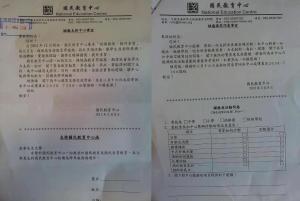Language is a key to not only civilisation, but also racial identity. It somehow put restrictions on the way you think.
As many know, Cantonese (UN recongised it as a language a while back) and English are the two official languages in Hong Kong. The majority of us speak both, mostly Cantonese in daily use. An interesting thing is, many Cantonese words used in Hong Kong (some in China use Cantonese, mainly in Guangdong) is derived directly from English. We also very often incorporate English words in our conversations too. Taxi drivers in Hong Kong can often speak a bit of English despite most of them have received very limited education.
So, as a newbie in Hong Kong, one would certainly be prepared to learn Cantonese – may not be fluent, but you should at least respect the local languages here.
If you are prepared to go to a local school, you will expect to be taught in Cantonese and English. That requires no explanation nor does it constitute any sort of discrimination.
Below are two clips with English subtitle:
Do you honestly think that using Cantonese for interviewing kindergartens in Hong Kong can be seen as discrimination? In universities, English is typically the language being used in lectures. Some courses, however, use Cantonese due to what is being taught at the course. If one choose to take up the Cantonese language lecture (there’s a Mandarin one, because there are too many Chinese studying in HK), could you blame the lecturer for using Cantonese as the medium of instruction? What I don’t understand is why did the university provide a Mandarin lecture specifically for Chinese students? It’s like an international student from France who study in the UK and he/she would naturally expect all lectures to be taught in English.
Discrimination is being used so very often in Hong Kong, particularly by the Chinese students and new immigrants. The thing is, many of the immigrants from China back in the days (early 40s to 60s), they only spoke their own dialects. They did, however, tried very hard to fit in and because they know if they didn’t fit in and learn the language, they would not be able to live in Hong Kong and find a job. This is simply logic. My parents, for example, were not aboriginal Hong Kongers. They also emigrated to Hong Kong decades ago (to flee from the Communists, of course). They never expected to not speak Cantonese and be able to survive in Hong Kong.
By having more and more Chinese immigrants who refuse to speak our language, Hong Kongers will become the minority and Cantonese will soon be lost. A language with thousands of years of history, yet has been modified over all these years. Cantonese in Hong Kong, in particular, changes rapidly – mainly due to the influence of British English and the colonial time.
One thing you’re probably not aware of if you do not read and write Cantonese, there are increasing number of terminologies have been changed into the Mandarin version, and are broadcast via TV channels (news and drama), radio channels, as well as newspapers. People are not aware of them if they’re not careful – 打造, for example, literally means “hit make”, is a term that’s been widely used in China. It is a newly created term to replace many words in Chinese languages, including ” 建造 (construct)”, “建設(build)”, “創造(create)”, etc.
This is a subtle change, but day by day, this kind of changes in use of word, replacement of terms will have tremendous impact to a race. Below is an abstract from the book 1984:
“It’s a beautiful thing, the Destruction of words. Of course the great wastage is in the verbs and adjectives, but there are hundreds of nouns that can be got rid of as well. It isn’t only the synonyms; there are also the antonyms. After all, what justification is there for a word, which is simply the opposite of some other word? A word contains its opposite in itself. Take ‘good,’ for instance. If you have a word like ‘good,’ what need is there for a word like ‘bad’? ‘Ungood’ will do just as well – better, because it’s an exact opposite, which the other is not. Or again, if you want a stronger version of ‘good,’ what sense is there in having a whole string of vague useless words like ‘excellent’ and ‘splendid’ and all the rest of them? ‘Plusgood’ covers the meaning or ‘doubleplusgood’ if you want something stronger still. Of course we use those forms already, but in the final version of Newspeak there’ll be nothing else. In the end the whole notion of goodness and badness will be covered by only six words – in reality, only one word. Don’t you see the beauty of that, Winston? It was B.B.’s idea originally, of course,” he added as an afterthought. (1.5.23, Syme)
As I said up front, language in a way constructs the way we think…
“Don’t you see that the whole aim of Newspeak is to narrow the range of thought? In the end we shall make thoughtcrime literally impossible, because there will be no words in which to express it. Every concept that can ever be needed will be expressed by exactly one word, with its meaning rigidly defined and all its subsidiary meanings rubbed out and forgotten.” (1.5.23, Syme)
Just leave this to you to think…
Over and out!

